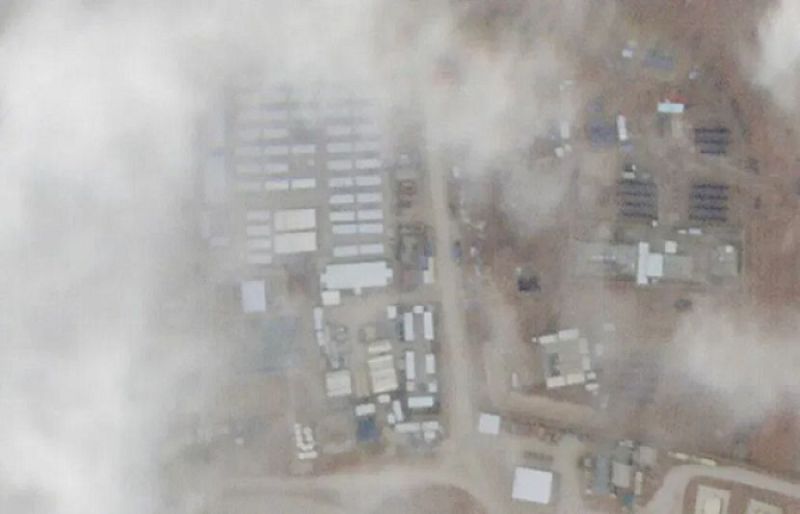The US carried out strikes against Iranian-linked forces in Iraq and Syria on Friday, hitting targets that included elements of Tehran’s Islamic Revolutionary Guard Corps, in retaliation for a drone attack that killed three American troops based in Jordan.
The US military’s Central Command said 85 targets at seven separate facilities were hit, including those associated with the IRGC’s Quds Force as well as Iranian-backed militia in the region. It was the first of what President Joe Biden said would be a series of retaliatory strikes.
“Our response began today,” Biden said in a statement released after the strikes were carried out. “It will continue at times and places of our choosing.”
The air strikes, including at four sites in Iraq and three in Syria, mark the first time the US has targeted the Quds Force directly in its escalating campaign in the region. The strikes will heighten fears that Washington is being drawn deeper into a widening regional conflict sparked by the Israel-Hamas war.
US officials signalled that Friday’s strikes were the first in a phased response.
“These responses began tonight, they’re not going to end tonight,” US National Security Council spokesperson John Kirby said. “There will be additional action that we will take — all designed to put an end to these attacks.”
Although Biden has said repeatedly he is not seeking to get involved in a wider war, he signalled on Friday that the US would continue to hit back if Iran and its proxies do not desist.
“The United States does not seek conflict in the Middle East or anywhere else in the world,” he said. “But let all those who might seek to do us harm know this: If you harm an American, we will respond.”
The IRGC is an elite Iranian military force tasked with defending the regime in Tehran and is separate from the country’s conventional military. Its Quds Force is responsible for overseas operations and trains and arms regional militant groups.
The US employed long-range B1 bombers in the attacks, among other aircraft, senior US officials said. The bombers flew from the US “in a single nonstop flight”, said Lieutenant General Douglas Sims, director for operations for the US Joint Chiefs of Staff.
More than 125 precision munitions were fired and hit facilities including command and control and intelligence centres; rocket, missile and drone storage sites; and logistic hubs, Centcom said. The strikes began at 4pm eastern time and lasted 30 minutes, US officials said.
“We made these strikes tonight with an idea that there would likely be casualties associated with people inside those facilities,” Sims said.
Initially, Biden showed restraint in the face of repeated attacks by Iran-backed militias on US military personnel in Iraq, Syria and Jordan. But in recent weeks, as those attacks escalated, the White House has recalibrated. The US last month launched a campaign of missile strikes against Iran-backed Houthi rebels in Yemen, who have been attacking commercial shipping in the Red Sea.
Iranian officials have said they do not seek direct conflict with the US and Israel, or a regional war and that the militant groups it backs have been acting independently. “We are not seeking war, but we are not afraid of it,” Major General Hossein Salami, commander of the IRGC, said on Wednesday.
Washington attributed last Sunday’s drone attack on its base in Jordan, which also injured 41 service members, to the Islamic Resistance in Iraq — a shadowy umbrella group that contains Kataib Hizbollah, a radical Shia militia, as well as other groups that have claimed responsibility for more than 160 attacks against US service members since mid-October, after the start of the Israel-Hamas war.
The IRI is part of Iran’s so-called Axis of Resistance, controlled by Iran, and has also targeted Israeli interests since Hamas’s attack on the Jewish state in October.
The bodies of the three US army reservists killed in Jordan arrived at Dover Air Force base in Delaware just hours before the air strikes began. The president and his wife Jill Biden attended the arrival ceremony on Friday afternoon.
Biden has been under pressure from some Republicans to hit Iran directly in response to last week’s attacks, which follow months of strikes by Houthi rebels on commercial vessels in the Red Sea, an important shipping lane for global trade.
The president’s decision to attack came after several meetings in recent days with his national security team to decide on an appropriate response. In the meantime, Kataib Hizbollah on Wednesday said it had halted attacks on US troops.
The US said it did not take that claim at “face value” and said Kataib Hizbollah was not the only group attacking its troops.


